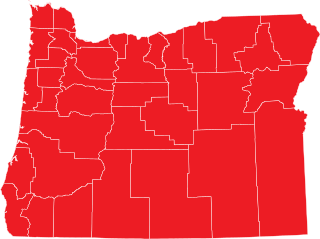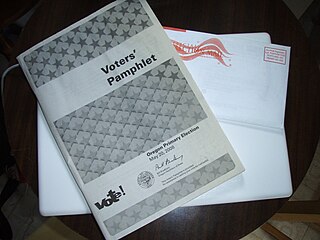Measure 28 was a ballot measure, referred by the legislature of the U.S. state of Oregon in 2003. It would have created a temporary one-percent increase in Oregon's income tax. The tax was proposed as a way to overcome deficits to the state budget. The measure was defeated in the January 28, 2003 special election with 575,846 votes in favor, 676,312 votes against.
Ballot Measure 47 was an initiative in the U.S. state of Oregon that passed in 1996, affecting the assessment of property taxes and instituting a double majority provision for tax legislation. Measure 50 was a revised version of the law, which also passed, after being referred to the voters by the 1997 state legislature.
The Oregon tax revolt is a political movement in Oregon which advocates for lower taxes. This movement is part of a larger anti-tax movement in the western United States which began with the passage of Proposition 13 in California. The tax revolt, carried out in large part by a series of citizens' initiatives and referendums, has reshaped the debate about taxes and public services in Oregon.

The U.S. state of Oregon established vote-by-mail as the standard mechanism for voting with Ballot Measure 60, a citizen's initiative, in 1998. The measure made Oregon the first state in the United States to conduct its elections exclusively by mail. The measure passed on November 3, 1998, by a margin of 69.4% to 30.6%.

The Oregon Medical Marijuana Act, a law in the U.S. state of Oregon, was established by Oregon Ballot Measure 67 in 1998, passing with 54.6% support. It modified state law to allow the cultivation, possession, and use of marijuana by doctor recommendation for patients with certain medical conditions. The Act does not affect federal law, which still prohibits the cultivation and possession of marijuana.
Term limits legislation – term limits for state and federal office-holders – has been a recurring political issue in the U.S. state of Oregon since 1992. In that year's general election, Oregon voters approved Ballot Measure 3, an initiative that enacted term limits for representatives in both houses of the United States Congress and the Oregon Legislative Assembly, and statewide officeholders. It has been described as the strictest term limits law in the country.

Oregon ballot measure 48 was one of two unsuccessful ballot measures sponsored by the Taxpayers Association of Oregon (TAO) on the November 7, 2006 general election ballot. Measure 48 was an initiated constitutional amendment ballot measure. Oregon statute currently limits state appropriations to 8% of projected personal income in Oregon. If Governor declares emergency, legislature may exceed current statutory appropriations limit by 60% vote of each house. This measure would have added a constitutional provision limiting any increase in state spending from one biennium to next biennium to the percentage increase in state population, plus inflation, over previous two years. Certain exceptions to limit, including spending of: federal, donated funds; proceeds from selling certain bonds, real property; money to fund emergency funds; money to fund tax, "kicker," other refunds were included in the provisions of the measure. It also would have provided that spending limit may be exceeded by amount approved by two-thirds of each house of legislature and approved by majority of voters voting in general election.

Elections in Oregon are all held using a Vote by Mail (VBM) system. This means that all registered voters receive their ballots via postal delivery and can vote from their homes. A state Voters’ Pamphlet is mailed to every household in Oregon about three weeks before each statewide election. It includes information about each measure and candidate in the upcoming election.

On November 4, 2008, the U.S. state of Oregon held statewide general elections for three statewide offices, both houses of the Oregon Legislative Assembly, and twelve state ballot measures. The primary elections were held on May 20, 2008. Both elections also included national races for President of the US, US Senator, and US House Representatives. Numerous local jurisdictions — cities, counties, and regional government entities — held elections for various local offices and ballot measures on these days as well.
Ballot Measure 36 of 1996 increased the U.S. state of Oregon's minimum wage from $4.75 to $6.50 over a three-year period. The measure was approved by voters in the 5 November 1996 general election, with 769,725 votes in favor and 584,303 votes against. The measure was placed on the ballot as a result of initiative petition.

Ballot Measure 65 was an initiated state statute ballot measure for the November 4, 2008 general election ballot in the state of Oregon. If it had passed, it would have replaced the current closed primary election system for partisan offices, in which each political party nominates its own candidate for the general election. The system proposed by Measure 65 bore similarities to a blanket primary and nonpartisan blanket primary.

Oregon Ballot Measure 58 was an initiated state statute ballot measure sponsored by Bill Sizemore that appeared on the November 4, 2008 general election ballot in Oregon. It was rejected by voters.

Oregon Ballot Measure 54 (2008) or House Joint Resolution is a legislatively referred constitutional amendment that removed provisions relating to qualifications of electors for school district elections. The measure is a technical fix designed to remove inoperative provisions in the Oregon Constitution which barred those under 21 from voting in school board elections and required voters to be able to pass a literacy test to vote in school district elections. This measure appeared on the November 4, 2008 general election ballot in Oregon. It was passed by voters, receiving 72.59% of the vote.

Oregon Ballot Measure 61 was an initiated state statute ballot measure that enacted law to create mandatory minimum prison sentences for certain theft, identity theft, forgery, drug, and burglary crimes.

The November 6, 2007, Special Election, was an off-year election in which no members of the Congress, statewide offices, or members of the Oregon Legislative Assembly were scheduled for election. However, two statewide measures were referred by the legislature to the 2007 November Special Election ballot. While there were only two issues on the ballot, they touched on important enough issues that they attracted one hundred seventy-five arguments in total, both in favor of, and against them in the voter's pamphlet.
The Oregon Center for Public Policy (OCPP) is an American economic research organization that conducts research on budget, tax, and economics issues. The organization says its goal is "to improve decision making and generate more opportunities for all Oregonians." The group has lobbied the government of Oregon since about 1990.
Electoral reform in Oregon refers to efforts to change election and voting laws in the West Coast state of Oregon.

Maine Question 4, formally An Act to Raise the Minimum Wage, is a citizen-initiated referendum question that appeared on the Maine November 8, 2016 statewide ballot. It sought to increase Maine's minimum wage from $7.50 per hour to $12 an hour by 2020, as well as increasing the minimum wage for tipped employees gradually to the same level by 2024. It would also index increases after 2024 to inflation. As the Maine Legislature and Governor Paul LePage declined to enact the proposal as written, it appeared on the ballot along with elections for President of the United States, Maine's two U.S. House seats, the Legislature, other statewide ballot questions, and various local elections. Efforts to place a competing, more moderate proposal alongside the citizen-initiated bill were unsuccessful.

















